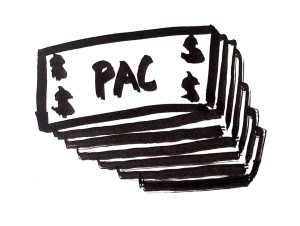10/13 Democratic Presidential Debate
After last night’s democratic debates, many of us are eager to learn more about campaign finance reform and the unique perspectives’ of each candidate. So, what are these “Super PACs”? that the candidates continue to reference? And why are they so important for the 2016 election?
Super PACs, or political action committees, are independent political committees that support a candidate with unlimited, often anonymous, donations from companies, unions, or individuals. The groups can’t contribute directly to a candidate, but they can run favorable ads about a candidate—or negative ones about their favored candidate’s opponent.
For years, money has been a deciding factor in political elections. In 2010, the Supreme Court decision in Citizens United v. Federal Election Commission stated that under the First Amendment, the government cannot prohibit independent spending from corporations or unions for political purposes, essentially marking the legality of the infusion of money into the presidential elections. That same year, the Court ruled that no limits could be placed on contributions that made independent expenditures in Speechnow.org. v. Federal Election Commission (FEC). However, there are guidelines to these types of donations. Super PACs are required to disclose donors, and cannot coordinate with candidates based on their individual agendas.
Many argue that super PACs provide political participation, level the playing field, enhance democracy, and engage in mostly positive promotion of candidates. Furthermore, the cost of an election has nearly doubled in the last 10 years, from $1,413,116,384 in the 2000 presidential election, to nearly $2,621,415,792 in 2012. Without money from super PACs and outside spending, how can one expect to win?
Others are fully against super PACs, including Bernie Sanders, who claimed no super PAC backing in last night’s Democratic debate. The democratic socialist from Vermont is a large opponent of campaign finance law and offers legislation to flush out “big money” of the political field. His socialist beliefs propel him to fight such important issues such as wealth inequity and the power of large corporations. Sanders’ refusal to accept affiliated super PAC donations is a large part of his platform, which calls for a “political revolution”. In last’s night’s debate, Sanders stated in his opening argument “our campaign finance system is corrupt and undermining american democracy…millionaires and billionaires pouring money…in order to fund super pacs…to elect candidates who represent their interests, not the interests of working people”. When asked the question from Anderson Cooper, moderator of the debates, “Who is your biggest enemy?”, Sanders responded “wall street”. Throughout the entire debate, Sanders focused on the corruption of the finance system and his adversary to Super PACs, which he noted even in this closing statement.
Another candidate refuses backing from super PACs as well– Donald Trump, whose live-tweets during the Democratic debates provided a different outlook on many key issues in this election. Trump has claimed to be his own super PAC, financing his own campaign. However, Trump, who states his financial independence from donors, seems to be friendly with a super PAC created in his honor. While Trump does not coordinate with the group on the same level as Jeb Bush or Hillary Clinton, who are strongly backed by super PACs, the connections are certainly stronger than Sanders’.
Regardless of political party, the influence of money in presidential elections is inevitable. These super PACs have a larger influence on campaigns than the average person realizes. The truth is that nobody can hope to be President without huge money backing their campaign. Even the less-notable democratic candidate Jim Webb references the power of the financial sector, labeling it a “reality we all need to recognize”. But, whether you support Sanders, Webb, Clinton, or Trump, it is important to know where their money comes from, and to think about whether your vote matters in competition with millions of dollars funded to a candidate. Since 1964, nearly every presidential election has been won by the president that spent the most money on his campaign. Whether this is by chance, well, that’s for you to decide. Yet, the question still remains in my mind, and apparently many 2016 candidates’ minds: are Presidents actually elected or simply bought?
Sources:
http://www.bloombergview.com/articles/2015-04-26/how-record-spending-will-affect-2016-election
http://www.politifact.com/truth-o-meter/statements/2015/sep/30/bernie-s/bernie-sanders-only-presidential-candidates-withou/
https://www.opensecrets.org/outsidespending/
